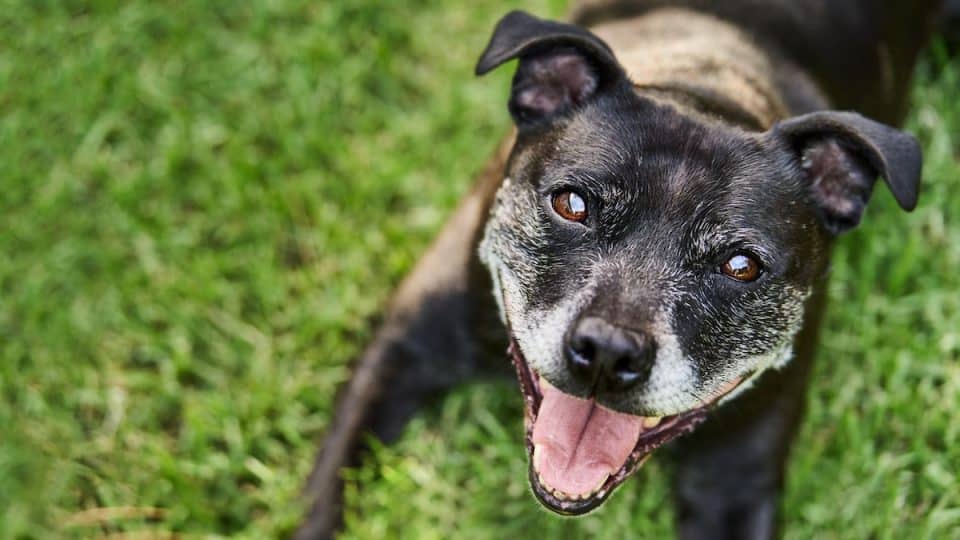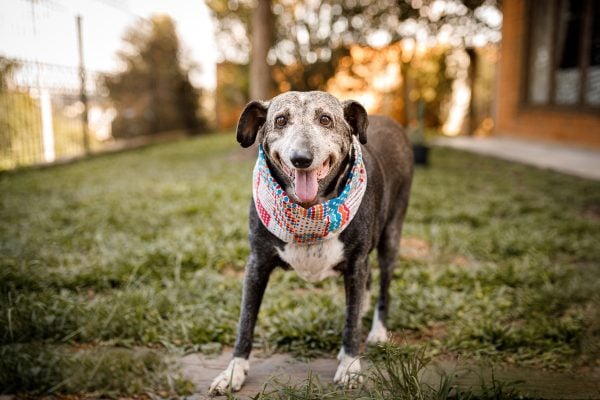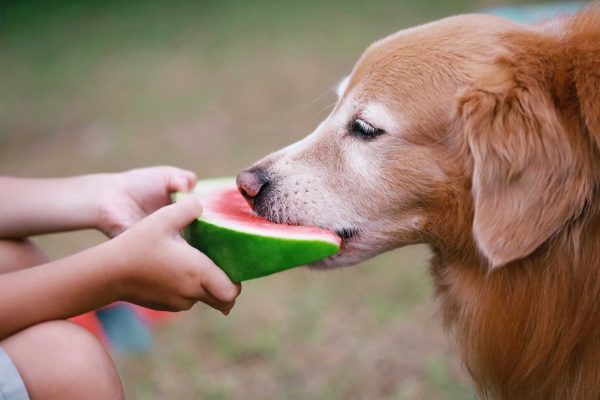- Not a substitute for professional veterinary help.
While dogs have shorter lifespans than people, they go through different life stages in a similar way. Most dogs will become seniors between the ages of 7-10, though there’s no universally accepted age.
A dog’s size, breed, and genetics all affect the rate of aging, with size having the most influence, says Dr. Michele Lentovich, emergency veterinarian at Tampa Bay Veterinary Specialists & Emergency Care Center.
To put it simply, larger dogs tend to age more quickly than smaller ones, though experts don’t know for certain why. It’s possible smaller dogs put less physical strain on their bodies, particularly their hearts, which may help them live longer.
Read on to learn how to recognize and support the changes your dog experiences as they age so you can give them the best senior years possible.
At What Age Does a Dog Become a Senior?
Generally speaking, dogs become seniors during the final quarter to third of their expected lifespan. A dog with a lifespan of 12 years would become a senior around age 8-9, while a dog with a lifespan of 15 years would become a senior around age 10-11.
Of course, gaining senior status doesn’t automatically mean your dog will slow down right away. The aging process is influenced by more than the number of candles on your pup’s birthday cake. Lifestyle, overall health, and daily care all play a role, too.
With the right support, many senior dogs remain active, playful, and full of energy!
Average senior ages by dog size and breed
The following chart breaks down when dogs typically start slowing down and when they’re considered seniors, based on their size.
| Dog size | When they start slowing down | When they’re considered seniors | Example breeds |
| Toy | 9-11 years | 11-12 years | Chihuahua, Pomeranian, Yorkshire Terrier |
| Small | 8-10 years | 10-12 years | Shih Tzu, Dachshund, Miniature Schnauzer |
| Medium | 7-8 years | 8-10 years | Cocker Spaniel, Border Collie, Bulldog |
| Large | 6-7 years | 7-9 years | Labrador Retriever, Boxer, Golden Retriever |
| Giant | 5-6 years | 6-7 years | Great Dane, Mastiff, Saint Bernard |
Signs Your Dog Is Becoming a Senior
If you notice early signs of aging in your dog, your vet can offer guidance about aging support and tips to adjust their care routine, if needed.
Early signs of aging
The following subtle shifts may be the first clues that your dog is entering their senior years:
- Grey or whitening fur, especially around the muzzle
- More frequent or longer naps
- Mild stiffness when getting up or after exercise
- A slight decrease in appetite
- Increased annoyance or impatience
- Brief moments of disorientation or confusion
- Trouble judging distances, like missing jumps
- Less interest in play or exercise
Changes to expect as your dog ages
As your dog continues to get older, you’ll notice more obvious signs they’ve entered their senior years. At this time, it’s a good idea to check in with your vet.
“Early support can help slow the aging process and preserve quality of life,” says Dr. Abel Gonzalez, clinical director and veterinarian at Dutch.
These signs include:
- Difficulty with everyday activities, like climbing stairs or jumping onto furniture
- Hearing loss
- Vision loss or cloudy eyes
- Signs of canine cognitive dysfunction (dog dementia)
- Weight gain or loss
- Weakened immune response
- More frequent or lingering symptoms from existing health issues
- Decline in coat condition or dental health
It’s also important to note that as your dog enters their senior years, they become more vulnerable to certain health issues.
“Medical concerns include arthritis, renal disease, cardiac disease, cancer, and dental disease,” Dr. Lentovich says.
Early intervention and regular monitoring can help manage age-related changes and keep your dog in good health. Your vet can also recommend helpful mobility aids, prescription diets, or daily medications.
Caring for Senior Dogs
Senior dogs may not have as much pep in their step as they once did, but they still have plenty of time to enjoy life! A little extra care and a few smart changes can help your older pup stay comfortable and content.
Consider these important steps
Increase vet checkups to twice a year
As dogs get older, they’re more likely to develop chronic conditions, like arthritis, dental disease, and organ dysfunction. That’s why Dr. Lentovich suggests bumping vet checkups to twice a year.
Those extra visits make it easier for your vet to find health concerns early and take steps to manage them.
Switch to senior dog food
Dr. Lentovich recommends switching to a senior dog food.
Senior-specific diets are often lower in calories but richer in fiber, joint-supporting nutrients, and easily digestible ingredients.
Manage your dog’s weight
Some senior dogs might slow down and gain weight, while others may lose muscle or feel less hungry and lose weight.
Maintaining a healthy weight helps reduce strain on joints and organs. Your vet can help you adjust portions for your dog or choose the right type of food to tempt a reluctant eater.
Boost your dog’s immune system
Older dogs tend to have weaker immune systems.
You can keep your dog’s defenses strong with:
- A balanced diet
- Daily activity
- Low-stress routines
- Vet-approved supplements like omega-3s, probiotics, or antioxidants
Encourage gentle activity and exercise
Daily walks and gentle play sessions go a long way in keeping your senior dog limber and strong.
Just pay attention to their energy and adjust the pace or length as needed. Some days they might be up for a longer walk, and some days they may need to keep it short.
Stimulate your dog’s mental health
Cognitive decline can start subtly and get worse without support. But a little brain work each day can help fight boredom and may slow down dementia.
You can keep your dog’s mind sharp with puzzle toys, refresher training, and sniffing games. Letting your dog explore new sights and smells can also make a big difference!
Consider joint supplements
As dogs age, their joints naturally experience more wear and tear, which can lead to stiffness or arthritis. Certain joint supplements, like glucosamine, chondroitin, or omega-3 fatty acids, may help reduce inflammation, support cartilage health, and improve mobility.
Just make sure to check with your vet before starting any supplement. They can let you know whether it’s safe and appropriate for your dog’s specific needs.
Stay up to date on vaccines
Senior dogs still need vaccinations to protect against diseases, especially as their immune systems weaken. Talk to your vet about your dog’s lifestyle to find out what vaccines they should get each year.
Senior-proof your dog’s environment
As your dog’s mobility, vision, or hearing starts to decline, Dr. Lentovich suggests taking steps to make your home safer and more comfortable for them.
Consider these senior-friendly upgrades for your dog:
- Raised food and water bowls to reduce neck strain
- Non-slip rugs to prevent slipping on slick floors
- Ramps or pet stairs to help them get on the couch or bed safely
- Dog-safe heat pads to soothe aching joints
- Nightlights for dogs with poor vision
- Baby gates to block off stairs or hazards
Keep up with grooming
Brushing your dog regularly helps prevent mats, which can lead to skin infections and hide underlying issues like tumors.
It’s also important to keep their nails trimmed, since overgrown nails can affect how your dog stands and walks. Long nails may lead to discomfort and can also make arthritis or joint problems worse.
Senior Dog Care FAQs
Will a puppy help my senior dog feel younger?
While it’s a sweet idea, bringing home a puppy won’t always rejuvenate an older dog. In fact, this could add stress—puppies are full of energy and may overwhelm senior dogs who prefer a quieter routine.
If you’re considering a new pet, make sure your senior pup is healthy, enjoys social interactions, and has space to retreat when they need rest.
What should I do when my senior dog needs boarding?
Senior dogs often don’t respond to boarding facilities the way they used to and may need more individualized and personal care while you’re away.
Less stressful environments, like luxury facilities or pet sitters with experience caring for older dogs, can make good alternatives. You can also hire a house sitter so your dog can stay in their own space and follow their regular routine. Always ask if the facility or sitter can accommodate any medications, mobility needs, or special diets.
When is it time to say goodbye to my dog?
Letting a dog go is one of the hardest decisions a pet parent can face. It may be time to consider saying goodbye if your dog experiences unmanageable pain, loss of mobility, frequent accidents, and loss of interest in food or affection. These signs usually represent a decline in your dog’s quality of life.
Your vet can help you assess their comfort and guide you through the decision to say goodbye.





